Protein: Can You Feed Too Much?
Protein is a very important component of all horse diets and as discussed in our post ‘Understanding Protein Quality’, the quality of protein used in diets will largely determine how well that diet can support functions that rely on protein including growth, reproduction, athletic performance and muscle building.
But can we get carried away with protein in a horse’s diet? Can too much protein be fed? And are the very high protein pastures that are so common nowadays a problem for horses? The answer to those questions is ‘yes and no’, it all depends on the circumstances your horse find itself in. Let’s look in more detail at when high protein diets may be a problem.
Protein is expensive!
When protein is fed in excess of protein requirements the horse will simply chop the protein up, remove the nitrogen and use what is left as a source of energy, so it isn’t completely wasted. BUT feeding protein as a source of energy is sort of like using notes of money instead of old newspaper to get a fire started. It will do the job, but it is an expensive way to do it. So when formulating a diet, use FeedXL to keep protein intake as close to requirements as is practically possible.
Wet and smelly bedding
Horses on high protein diets will, as discussed above just chop the protein up and burn it essentially like a carbohydrate. But they then need to get rid of the nitrogen they didn’t need from the protein. To do this, nitrogen is turned into urea and excreted in the urine. Getting rid of waste nitrogen requires a lot of water so horses on high protein diets tend to drink AND urinate a lot. Now, this isn’t a problem if your horse has ready access to water and lives outside. But for horses in stables, feeding too much protein is going to mean a whole lot of extra wet bedding for you to muck out every day, which is time consuming and can be expensive depending on what you pay for bedding.
Perhaps a bigger issue for stabled horses on high protein diets is the strong smell of ammonia that develops as the excreted urea is converted to ammonia in the bedding. Ammonia can irritate airways and cause respiratory issues, especially in poorly ventilated stable areas, so meeting but not unnecessarily exceeding protein intakes is particularly important for horses confined to stables for long periods of time.
Heat production
The digestion and metabolism of protein generates more heat than the digestion and metabolism of fat and carbohydrate. So a horse on a high protein diet that is burning a lot of protein as a source of energy will need to get rid of more body heat and in doing this will sweat more. This increased rate of sweating, together with the extra urine production needed to remove the waste urea from the horse’s body combine to increase a horse’s water requirement.
If the horse in question is only in light work, has free access to water and doesn’t live in a hot climate, the high protein diet really won’t pose an issue. However, if a horse is in moderate to heavy work, and particularly if that work is endurance type work or the horse lives in a hot climate the excess heat production from the high protein diet could lead to problems with dehydration and heat stress. Connysson et al (2006) observed that protein intakes of 160% of requirements did disrupt fluid balance (by increasing water loss through sweating and urination) so keeping working horse protein intakes below this level may assist with maintaining good levels of hydration. These researchers observe no negative impact of this level of protein on performance in the horses studied.
Hyperactivity
Protein is sometimes blamed for making horses ‘hot’ and some horse owners will actively select low protein feeds in an effort to keep their horses calm. This however is mostly a wives tale. Diets that are higher in energy than a horse’s true energy needs can and often will make a horse hyperactive. If you are feeding a very high protein diet, chances are this diet is also going to be a high energy diet … AND all the horse is going to do with the extra protein it is being fed is cut it up and burn it for energy. So it isn’t the protein, as such, causing problems with behaviour, but instead the amount of energy in the diet.
What about the liver and kidneys?
High protein diets have also long been blamed for damaging liver and kidney function. There is no evidence (that I can find) to suggest that healthy horses with a fully functioning liver and kidneys suffer any kind of harm to these organs on a high protein diet. However if a horse has a pre-existing problem with either its liver or kidneys a low protein diet that meets but does not exceed protein requirements is recommended.
Managing protein intakes on high protein pastures
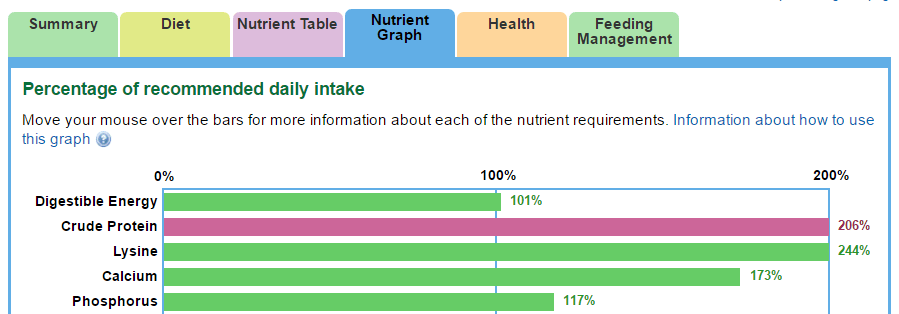
Most of the time when protein intake is indicated as being excessive in FeedXL it will be due to a very high protein pasture playing a prominent role in the diet. This may not be a problem if your horse is healthy, living in a temperate or cool environment, living outdoors and in light work, breeding, growing or not doing anything at all. However, if your horse is stabled for periods of time, living in a hot climate or is in moderate to heavy work it would be advisable to try and reduce protein intakes by reducing pasture intake. This is often best done by keeping the horse off pasture for a period of time during the day or night and providing a lower protein grass hay. The use of lucerne/alfalfa hay should also be minimised or stopped altogether when horses are grazing high protein pastures.
Use high quality protein
When feeding protein a major consideration is whether that protein is meeting your horse’s requirement for essential amino acids. Using the best quality protein you have available will allow you to meet lysine (and other essential amino acid) requirements without having to feed excessive amounts of crude protein. Using low quality protein will mean you have to feed more crude protein to meet essential amino acid requirements and the higher level of crude protein may interfere with your horse’s hydration, heat load and air quality as discussed above.
Take Home Message
If your horse:
- lives in a hot climate
- is stabled all or part of the time
- is in moderate to heavy work; and/or
- has a pre-existing liver or kidney disease
You should keep protein intakes within the acceptable limits for protein set by FeedXL (and in the case of liver or kidney disease keep intakes as close to 100% of requirements as possible) to avoid the issues discussed above.
However, if your horse is:
- healthy
- living in a temperate or cool environment
- living outdoors; and
- in light work, breeding, growing or not doing anything at all
Excess protein in the diet will simply be chopped up and used for energy. However you should still avoid feeding more protein than you need to because it is expensive and doesn’t provide any benefit to your horse.
Do you have a question or comment? Do you need help with feeding?
We would love to welcome you to our FeedXL Horse Nutrition Facebook Group. Ask questions and have them answered by PhD and Masters qualified equine nutritionists and spend time with like-minded horse owners. It’s free!
Click here to join the FeedXL Horse Nutrition Facebook Group

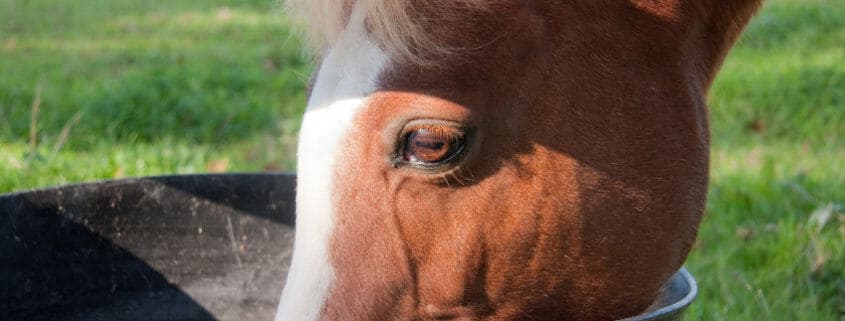


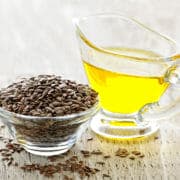

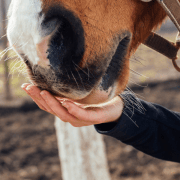
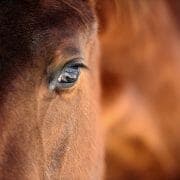
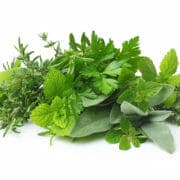



I followed the recommended protein intake for years using Feed XL’s nutrient graph but discovered that my OTTB, who hasn’t raced in 10 years, completely blossomed when I chucked that number out the window and just fed whole oats and high quality alfalfa. The 20+lbs of alfalfa and 8-10lbs of oats has given my guy a topline to die for and the playfulness has hasn’t had in years. It is also super cheap compared to the specially tailored diets I had been creating trying to keep my bar graphs all in the green. We live in the extremely hot and humid southern GA and my horse is stalled for 15 hours daily but I haven’t had any issues with ammonia or increased sweating… I have heard similar things from other TB owners so perhaps requirements change by breed?
Hi Becca, this is very possible that different breeds, or perhaps even more likely, different individual horses have different protein requirements. What you may also have done is change the overall quality of protein in the diet as this would certainly have this affect. Alfalfa can have more, but certainly has better quality protein than grassy forages. Do you remember what you were feeding prior to the change, I’d love to know so I could do a rough comparison on protein quality 🙂 (info on protein quality here: https://feedxl.com/30-understanding-protein-quality/)
What whole foods is considered to be a high quality protein?
Thank you!
Hi Liz, we have information about Protein Quality and the quality of protein in various feedstuffs that you might find useful here: https://feedxl.com/30-understanding-protein-quality/ 🙂
Hi Nerida
I have this issue of protein in excess. Though I haven’t seen any problems with my horses.
How can I reduce the protein levels, while still maintaining the roughage required. I find most of the time the protein is coming from the grass hay which can’t be restricted.
Thank you
Marni
Ohhh Marni, this is really difficult. Your only real option is to source hay with a lower protein content… which isn’t always practical either. In saying that, I tend not to worry much (if at all) when horses are on diets high in protein when the protein is coming largely from grass forage and where there are no problems occurring.
It would be worth being mindful of the protein levels in supplementary feeds you are giving so you don’t add a lot more than is required there. Not sure I’ve helped at all…